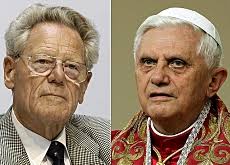 The dissenter theologian says he will hold Benedict XVI responsible for the schism that would be created if he signs an agreement with the Lefebvrians.
The dissenter theologian says he will hold Benedict XVI responsible for the schism that would be created if he signs an agreement with the Lefebvrians.
The Pope has been calling for unity since the beginning of his Pontificate and in the last Chrism Mass he dealt with the issue of the disobedience of Austrian priests belonging to the Pfarrer-Initiative movement.
And yet it is Benedict XVI himself who is being accused by his lifelong dissenting colleague, Hans Küng, of “provoking” disobedience. Küng goes as far as to call the Pope “schismatic” if he goes ahead and gives canonical recognition to the Society of St. Pius X, founded by Mgr. Lefebvre.
Küng’s harsh accusation was recently published in German newspaper Südwestpresse. He writes that preparations for the “final recognition” of the Lefebvrians (which he wrongly predicted would take place by Pentecost) are already underway and that recognition would be granted “even at the cost of integrating them into the Church using canonical subterfuge.”
He recalled that the members of the Fraternity “continue to reject fundamental documents of the Council.”
Küng claims that “The Pope would be definitively including in the Church bishops and priests that are invalidly ordained.”
The Swiss theologian backed up his claim by referring to the Apostolic Constitution of Paul VI Pontificalis Romani Recognitio of 18 July 1968 and the positions of an “influential member of the Ecclesia Dei Commission, Karl Josef Becker SI, currently a cardinal.”
In truth, while everyone agrees about the fact that the priestly and Episcopal ordinations carried out by Lefebvre after his suspension a divinis and his excommunication in 1988 are “illicit”, practically no one expressed any serious doubts over their “validity”: the ordinations were celebrated by a bishop who was in apostolic succession and according to the rite used by the Catholic Church up until the post-conciliar liturgical reform.
But Küng goes further, inaugurating a sort of potential liberal “sedevacantism”. According to Küng, by welcoming the Lefebvrians, the Pope “would distance himself further from the people of God.”
Küng writes that Benedict XVI should remember that “there is a schism in the Church when one separates themselves from the Pope, but also when one separates themselves from the entire Church body.”
“According to canonical doctrine, a schismatic pope - the Swiss theologian writes - loses his ministry and can certainly expect obedience. As such, Pope Benedict XVI would encourage the “disobedience” movement - which is on the rise everywhere – as opposed to a hierarchy that shows disobedience to the Gospel. He would be exclusively responsible for the serious discord and quarrels that he would bring into the Church” by accepting the Lefebvrians.
“Instead of reconciliating the ultraconservative, ultra-democratic and anti-Semitic Society of St. Pius X with the Catholic Church - Küng concludes – the Pope should focus on the majority of Catholics who are ready for reform and reconciliation with the reformed Churches: by doing so he would unite and not separate.”
This tough accusation is a first for Hans Küng, who has never before attacked the Pope using traditional arguments.
In so doing he introduces a liberal form of “sedevacantism”, using the same arguments used by the traditionalist anti-conciliar sedevacantists, but reversed.
